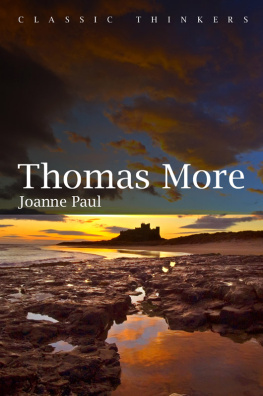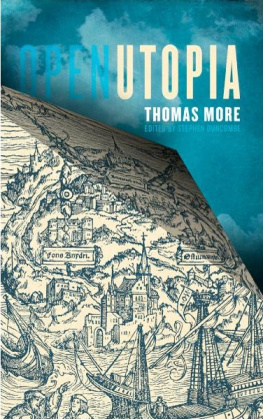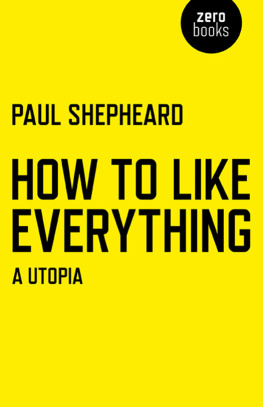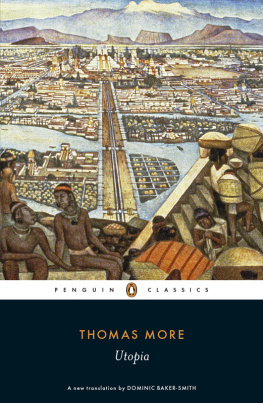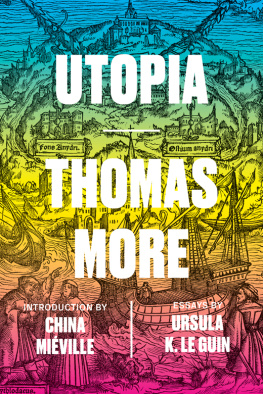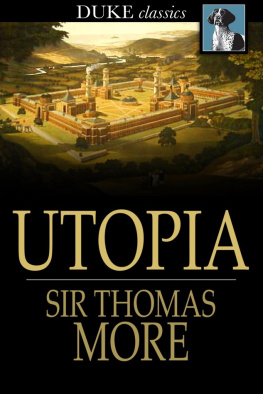More Thomas - Utopia
Here you can read online More Thomas - Utopia full text of the book (entire story) in english for free. Download pdf and epub, get meaning, cover and reviews about this ebook. genre: Science. Description of the work, (preface) as well as reviews are available. Best literature library LitArk.com created for fans of good reading and offers a wide selection of genres:
Romance novel
Science fiction
Adventure
Detective
Science
History
Home and family
Prose
Art
Politics
Computer
Non-fiction
Religion
Business
Children
Humor
Choose a favorite category and find really read worthwhile books. Enjoy immersion in the world of imagination, feel the emotions of the characters or learn something new for yourself, make an fascinating discovery.
- Book:Utopia
- Author:
- Genre:
- Rating:3 / 5
- Favourites:Add to favourites
- Your mark:
- 60
- 1
- 2
- 3
- 4
- 5
Utopia: summary, description and annotation
We offer to read an annotation, description, summary or preface (depends on what the author of the book "Utopia" wrote himself). If you haven't found the necessary information about the book — write in the comments, we will try to find it.
Utopia — read online for free the complete book (whole text) full work
Below is the text of the book, divided by pages. System saving the place of the last page read, allows you to conveniently read the book "Utopia" online for free, without having to search again every time where you left off. Put a bookmark, and you can go to the page where you finished reading at any time.
Font size:
Interval:
Bookmark:
The Project Gutenberg eBook, Utopia, by Thomas More, Edited by Henry Morley
This eBook is for the use of anyone anywhere at no cost and with
almost no restrictions whatsoever. You may copy it, give it away or
re-use it under the terms of the Project Gutenberg License included
with this eBook or online at www.gutenberg.net
Title: Utopia
Author: Thomas More
Release Date: April 22, 2005 [eBook #2130]
Language: English
Character set encoding: ISO-646-US (US-ASCII)
***START OF THE PROJECT GUTENBERG EBOOK UTOPIA***
Transcribed from the 1901 Cassell & Company Edition by David Price, email ccx074@coventry.ac.uk
Sir Thomas More, son of Sir John More, a justice of the Kings Bench, was born in 1478, in Milk Street, in the city of London. After his earlier education at St. Anthonys School, in Threadneedle Street, he was placed, as a boy, in the household of Cardinal John Morton, Archbishop of Canterbury and Lord Chancellor. It was not unusual for persons of wealth or influence and sons of good families to be so established together in a relation of patron and client. The youth wore his patrons livery, and added to his state. The patron used, afterwards, his wealth or influence in helping his young client forward in the world. Cardinal Morton had been in earlier days that Bishop of Ely whom Richard III. sent to the Tower; was busy afterwards in hostility to Richard; and was a chief adviser of Henry VII., who in 1486 made him Archbishop of Canterbury, and nine months afterwards Lord Chancellor. Cardinal Mortonof talk at whose table there are recollections in Utopiadelighted in the quick wit of young Thomas More. He once said, Whoever shall live to try it, shall see this child here waiting at table prove a notable and rare man.
At the age of about nineteen, Thomas More was sent to Canterbury College, Oxford, by his patron, where he learnt Greek of the first men who brought Greek studies from Italy to EnglandWilliam Grocyn and Thomas Linacre. Linacre, a physician, who afterwards took orders, was also the founder of the College of Physicians. In 1499, More left Oxford to study law in London, at Lincolns Inn, and in the next year Archbishop Morton died.
Mores earnest character caused him while studying law to aim at the subduing of the flesh, by wearing a hair shirt, taking a log for a pillow, and whipping himself on Fridays. At the age of twenty-one he entered Parliament, and soon after he had been called to the bar he was made Under-Sheriff of London. In 1503 he opposed in the House of Commons Henry VII.s proposal for a subsidy on account of the marriage portion of his daughter Margaret; and he opposed with so much energy that the House refused to grant it. One went and told the king that a beardless boy had disappointed all his expectations. During the last years, therefore, of Henry VII. More was under the displeasure of the king, and had thoughts of leaving the country.
Henry VII. died in April, 1509, when Mores age was a little over thirty. In the first years of the reign of Henry VIII. he rose to large practice in the law courts, where it is said he refused to plead in cases which he thought unjust, and took no fees from widows, orphans, or the poor. He would have preferred marrying the second daughter of John Colt, of New Hall, in Essex, but chose her elder sister, that he might not subject her to the discredit of being passed over.
In 1513 Thomas More, still Under-Sheriff of London, is said to have written his History of the Life and Death of King Edward V., and of the Usurpation of Richard III. The book, which seems to contain the knowledge and opinions of Mores patron, Morton, was not printed until 1557, when its writer had been twenty-two years dead. It was then printed from a MS. in Mores handwriting.
In the year 1515 Wolsey, Archbishop of York, was made Cardinal by Leo X.; Henry VIII. made him Lord Chancellor, and from that year until 1523 the King and the Cardinal ruled England with absolute authority, and called no parliament. In May of the year 1515 Thomas Morenot knighted yetwas joined in a commission to the Low Countries with Cuthbert Tunstal and others to confer with the ambassadors of Charles V., then only Archduke of Austria, upon a renewal of alliance. On that embassy More, aged about thirty-seven, was absent from England for six months, and while at Antwerp he established friendship with Peter Giles (Latinised gidius), a scholarly and courteous young man, who was secretary to the municipality of Antwerp.
Cuthbert Tunstal was a rising churchman, chancellor to the Archbishop of Canterbury, who in that year (1515) was made Archdeacon of Chester, and in May of the next year (1516) Master of the Rolls. In 1516 he was sent again to the Low Countries, and More then went with him to Brussels, where they were in close companionship with Erasmus.
Mores Utopia was written in Latin, and is in two parts, of which the second, describing the place ([Greek text]or Nusquama, as he called it sometimes in his lettersNowhere), was probably written towards the close of 1515; the first part, introductory, early in 1516. The book was first printed at Louvain, late in 1516, under the editorship of Erasmus, Peter Giles, and other of Mores friends in Flanders. It was then revised by More, and printed by Frobenius at Basle in November, 1518. It was reprinted at Paris and Vienna, but was not printed in England during Mores lifetime. Its first publication in this country was in the English translation, made in Edwards VI.s reign (1551) by Ralph Robinson. It was translated with more literary skill by Gilbert Burnet, in 1684, soon after he had conducted the defence of his friend Lord William Russell, attended his execution, vindicated his memory, and been spitefully deprived by James II. of his lectureship at St. Clements. Burnet was drawn to the translation of Utopia by the same sense of unreason in high places that caused More to write the book. Burnets is the translation given in this volume.
The name of the book has given an adjective to our languagewe call an impracticable scheme Utopian. Yet, under the veil of a playful fiction, the talk is intensely earnest, and abounds in practical suggestion. It is the work of a scholarly and witty Englishman, who attacks in his own way the chief political and social evils of his time. Beginning with fact, More tells how he was sent into Flanders with Cuthbert Tunstal, whom the kings majesty of late, to the great rejoicing of all men, did prefer to the office of Master of the Rolls; how the commissioners of Charles met them at Bruges, and presently returned to Brussels for instructions; and how More then went to Antwerp, where he found a pleasure in the society of Peter Giles which soothed his desire to see again his wife and children, from whom he had been four months away. Then fact slides into fiction with the finding of Raphael Hythloday (whose name, made of two Greek words [Greek text] and [Greek text], means knowing in trifles), a man who had been with Amerigo Vespucci in the three last of the voyages to the new world lately discovered, of which the account had been first printed in 1507, only nine years before Utopia was written.
Designedly fantastic in suggestion of details, Utopia is the work of a scholar who had read Platos Republic, and had his fancy quickened after reading Plutarchs account of Spartan life under Lycurgus. Beneath the veil of an ideal communism, into which there has been worked some witty extravagance, there lies a noble English argument. Sometimes More puts the case as of France when he means England. Sometimes there is ironical praise of the good faith of Christian kings, saving the book from censure as a political attack on the policy of Henry VIII. Erasmus wrote to a friend in 1517 that he should send for Mores Utopia, if he had not read it, and wished to see the true source of all political evils. And to More Erasmus wrote of his book, A burgomaster of Antwerp is so pleased with it that he knows it all by heart.
Font size:
Interval:
Bookmark:
Similar books «Utopia»
Look at similar books to Utopia. We have selected literature similar in name and meaning in the hope of providing readers with more options to find new, interesting, not yet read works.
Discussion, reviews of the book Utopia and just readers' own opinions. Leave your comments, write what you think about the work, its meaning or the main characters. Specify what exactly you liked and what you didn't like, and why you think so.



